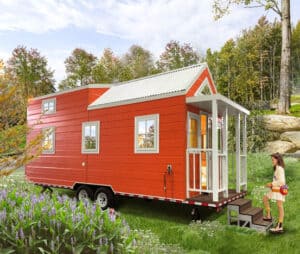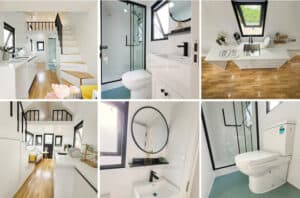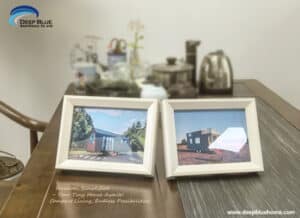Have you ever imagined a home that can move with you, adapting to different lifestyles and needs? Tiny Houses on Wheels are doing just that, sparking a global revolution in the housing industry. But what makes these compact, mobile dwellings so appealing, and how are they reshaping the future of living? Let’s dive into the world of tiny houses and explore their innovative features, practical applications, and industry – changing impact.
What Are Tiny Houses on Wheels?

Tiny Houses on Wheels are exactly what their name suggests: fully – functional homes built on a mobile chassis, breaking free from the constraints of traditional stationary housing. Ranging from 10 to 40 square meters, these homes are designed to be towed by trucks or SUVs, offering unprecedented mobility.
In terms of construction, Deepblue Smarthouse, as leading companies in the industry, leverage advanced manufacturing techniques. We use Light Gauge Steel (LGS) framing, known for its high strength – to – weight ratio. This material not only reduces the overall weight of the house for easier transportation but also provides excellent resistance to earthquakes and harsh weather conditions, ensuring top – notch quality and durability.
Why Are They Gaining Popularity?
Flexibility and Mobility
One of the primary reasons for the surge in popularity is their flexibility. Whether you’re a digital nomad seeking new work environments, an adventurer yearning to explore different landscapes, or a resident in a disaster – prone area, tiny houses on wheels offer unparalleled freedom. In regions frequently hit by hurricanes, floods, or wildfires, residents can quickly relocate their homes to safety, minimizing property damage and ensuring personal security.
Cost – Effectiveness
Financially, tiny houses on wheels are a game – changer. They are a fraction of the price of traditional homes. This affordability makes homeownership accessible to a wider range of people, including young professionals and those on a tight budget. Moreover, their small size results in lower utility bills, further reducing long – term living costs.
Sustainability
In an era of growing environmental awareness, tiny houses on wheels are at the forefront of sustainable living. Many models use eco – friendly materials, such as recycled wood and biodegradable insulation, significantly reduces the carbon footprint, making these homes an environmentally responsible choice.
How Do They Optimize Space?

Despite their small size, tiny houses on wheels are marvels of space optimization. How do designers achieve this? Through innovative design and smart technology.
Modular design is a key feature, allowing homeowners to customize their living spaces according to specific needs. For example, some models can be equipped with expandable living areas, transforming a compact home into a more spacious one when needed. Foldable furniture, such as Murphy beds and drop – leaf tables, maximizes floor space during the day and can be easily set up for use at night. Vertical storage solutions, including built – in shelves and cabinets that reach the ceiling, make full use of the available height, ensuring that every inch of the house is utilized efficiently.
What Are Their Industry Applications?

Disaster Relief
In the field of disaster relief, tiny houses on wheels play a crucial role. Their quick deployment capabilities make them ideal for providing immediate shelter to displaced populations. Organizations can rapidly transport and set up these homes in affected areas, offering safe and comfortable living spaces until more permanent solutions are available.
Tourism and Hospitality
The tourism industry has also embraced tiny houses on wheels. Many resorts and campsites now offer tiny house rentals, attracting travelers looking for unique and immersive accommodation experiences. These rentals can be customized to fit different tourist needs, from luxury – equipped tiny houses for high – end travelers to more rustic models for nature enthusiasts.
Real Estate Investment
For real estate investors, tiny houses on wheels present a new and profitable opportunity. With their low initial investment and high rental potential, especially in popular tourist destinations or areas with high housing demand, they offer an attractive return on investment. Platforms like Airbnb have made it easier than ever to rent out these properties, further fueling their appeal as an investment option.
Tiny Houses on Wheels are not just a housing trend, they represent a fundamental shift in how we think about living spaces. With their combination of mobility, affordability, sustainability, and innovative design, they offer solutions to some of the most pressing challenges in the housing industry. Deepblue Smarthouse, with its strong R & D capabilities and commitment to quality, continues to lead the way in this field, providing customized tiny house solutions for diverse needs. Whether you’re considering a new lifestyle, an investment opportunity, or a sustainable housing solution, tiny houses on wheels are worth exploring.

